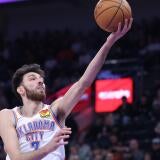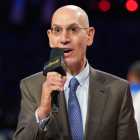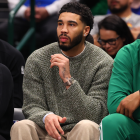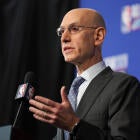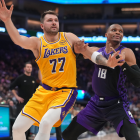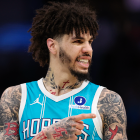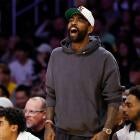Baseline Awards: What if there were an Offensive Player of the Year?
Judging the Offensive Player of the Year, if there were such a thing.
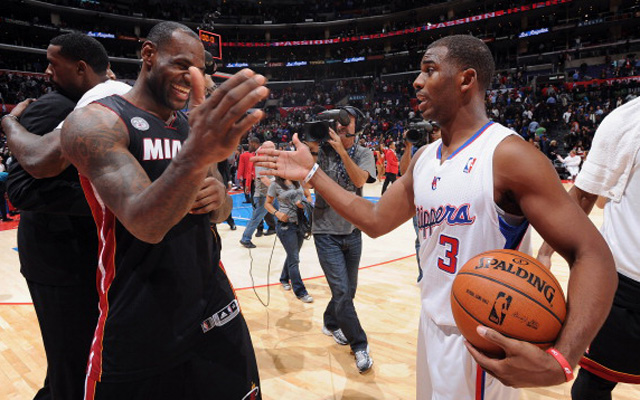 |
| LeBron James and Chris Paul are arguably the best offensive players in the business. (Getty Images) |
I've long advocated for eliminating the MVP award and instead adding Most Outstanding Player and Offensive Player of the Year, and elevating Defensive Player of the Year to the standing it deserves. The result would be a higher standard for the most elite players in the game. Winning all three would create a standard to join the truly most elite while more accurately giving credit for players' performances.
Next month I'll touch on why this change needs to happen. But this week I wanted to touch on who would be in the running if the NBA had an Offensive Player of the Year.
Why doesn't this award exist? It's as if the NBA doesn't want to come right out and advocate the score-first mentality, prefering to say that only defensive focus should be rewarded. And yet it actively campaigns to make only offensive players its stars, in reaction to public perception. Michael Jordan was a terrific defender, but it's his offense that defines his legacy. Kobe Bryant is arguably the second-best offensive player of all time. Players who score go on posters. Players who defend go on posters for bad reasons.
So shouldn't the approach be to put a different level of emphasis on defense, as the NFL does, lifting defensive players to the same level, while giving offensive players their due? You need both sides to win a game; why not celebrate offensive brilliance?
The tricks with an Offensive Player of the Year Award deal with three factors.
1. How do you factor assists?
Chris Paul runs the Clippers' offense and is directly responsible for making it efficient and effective. If Paul isn't the one putting the ball in the bucket, but is otherwise responsible for it more than anyone else, does that factor in? An assist, after all, requires production from the other person to make it work. But without the pass, there is no conversion.
2. What's the cost of efficiency?
This is a new one. Years ago, as long as the buckets came in bulk, it didn't matter what the cost of delivery was. But as analysis has become smarter, and the concept of the game being played in possessions and not minutes became more prominent, usage has started to affect our estimation of a player's ability. It's no longer good enough to score 30 points on 30 shots. In today's game you need to produce points at a high ratio to possessions used.
3. Do the shots come at the cost of the offense
This is where the metrics aren't going to reveal the impact. You have to factor how often a player works in a way that's counterproductive to the best interests of the team. If an offense is clearly more effective when ball movement and shared usage is employed (and this isn't always the case, surprisingly), and a player wants to "iso" till the cow comes home, that should factor against him. Likewise, if an offense struggles when the player doesn't assert himself, that needs to be considered.
Maybe the reason the NBA doesn't award Offensive POY is that it would be subject to too much consideration, while Defensive POY typically drifts by in a cloud of blocks and rebounds, as if those things really described a player's ability to prevent scoring by an opponent. (Rebounds are vital in limiting the number of possessions and should be considered, and blocks obviously prevent a score. But simply watching the defensive management of many of the young shot-blockers will reveal how often the pursuit of the block actually contributes to points allowed.)
With that in mind, if we were to look at candidates, here's how they shape up.
First, let's look at some numbers:
Points per game (the standard bearer)
1. Kevin Durant, Thunder
2. Carmelo Anthony, Knicks
3. Kobe Bryant, Lakers
4. LeBron James, Heat
5. James Harden, Rockets
Offensive win-shares (quite the complicated stat)
1. Kevin Durant, Thunder
2. LeBron James, Heat
3. Chris Paul, Clippers
4. James Harden, Rockets
5. Tyson Chandler, Knicks
But I wanted to look at something a little different. I was interested in a messier, less refined but slightly more complex metric to establish how many points a player contributes. HoopData.com provides an adjusted assist metric, which factors in how many three-pointers a player's assist leads to. I combined points per 40 minutes with adjusted assists multiplied by 2*. The results were ... interesting.
(Note: My biggest issue with the modern attribution of assists, besides how arbitrarily they can be attributed, is that they're never awarded in relation to passes that lead to free throws. It's 2013 -- we haven't come up with an answer on this?)
Points contributed per 40 minutes
1. Chris Paul, Clippers: 45.7
2. Russell Westbrook, Thunder: 45.2
3. Tony Parker, Spurs: 44.8
4. LeBron James, Heat: 44.6
5. Jrue Holiday, Sixers: 41.5
A few interesting notes: Kobe Bryant lands sixth, right behind Holiday at 41.2. Kyrie Irving comes in at seventh, James Harden ninth and Carmelo Anthony only 13th.
Let's be clear. This doesn't look at possession data, it doesn't factor in pace and it's not even attempting efficiency. It's simply a measure of volume production. I was curious about the cost of turnovers. The issue with trying to consider that within this context is you can't determine whether a possession lost to a turnover would have netted 0, 1, 2, or 3 points. But just for the sake of considering it, let's imagine that the average turnover costs 2 points. It doesn't, but I'm asking you to hop on the Magical Mystery Tour for this one.
Points contributed per 40 minutes, factoring turnovers
1. Chris Paul, Clippers: 40.5
2. (tie) Tony Parker, Spurs: 38.8
2. (tie) LeBron James, Heat: 38.8
4. Russell Westbrook, Thunder: 37.6
5. Jose Calderon, Raptors: 34.3
No surprise, the league's best passer lands No. 1, and the league's most potent offense yields one of the most effective offensive producer in Parker. Tied with him is the league's best and most versatile player. Westbrook slips here but remains near the top, above Durant due to the assist prodcution. Jose Calderon, of the surprisingly powerful Raptors offense manages to worm his way in ahead of Kobe Bryant, who lands sixth. And hey, Kyle Lowry, good to see him landing at seventh. Durant and Melo finish eighth and ninth, with Harden, Irving, and Manu Ginobili slipping down the ranks on account of their turnovers.
So looking at the standard metrics and these messier and less convincing metrics I've bothered to compile, we start to see some candidates emerge. Chris Paul, largely because of his balance between scoring and assists, is on the list, as is LeBron James to no one's surprise.
But if we move past the complications of the assists question, it's impossible to ignore Kevin Durant and Carmelo Anthony, based on scoring production alone. After all, their own scoring doesn't present the complications of teammates that can score off their passes, and they're the central scoring options on two of the best offenses in the league.
Durant is the best scorer in the league. He's averaging 29.6 points while shooting 52 percent from the field, 41 percent from three and 90 percent from the free throw line, puting him on track to be the first scoring leader in history to average 50-40-90 in a season.
If we examine some of the scorer-defining play sets through Synergy, though, there are some interesting results. Durant is actually a better post scorer than you'd expect, as he has transformed his game this season. He's second among all post scorers with 100 possessions behind Kobe Bryant.
But isolation, which is unquestionably the most direct indication of a player's scoring ability off the dribble, James actually lands higher among scorers with 100 possessions or more. Irving leads all players in that area, with O.J. Mayo and Jamal Crawford along with Damian Lillard in the top five.
James is also in the top five among scorers in the pick and roll as a ball-handler.
The lesson? LeBron may somehow actually be underrated as an offensive force.
If we consider all the factors above, and many more, this is as close to a list as I can come up with:
Offensive Player of the Year
1. LeBron James, Heat: If need be, he can act as the passer, the isolation scorer, the postup man, the tip of the spear, anything. Has improved his 3-point shooting and is physically unguardable.
2. Kevin Durant, Thunder: The best individual scorer. Unguardable from any distance with any scheme. You cannot defend him, no matter how good your spacing, contest, or approach is.
3. Chris Paul, Clippers: The best floor general on the planet. It's not just that Paul is a brilliant passer; it's that he constantly and consistently makes the pass to capitalize on the opponent's mistakes. And if you focus on covering everyone else, there is no other player you want forcing the switch on the big in the pick-and-roll to isolate less than Paul.
4. Tony Parker, Spurs: Runs the best offensive scheme in the land, and the Spurs' juggernaut offense of ball movement doesn't function without Parker. His ability to draw the defense, then deliver is balanced by the way he knifes in-between defenders regularly for the score.
5. Kobe Bryant, Lakers: It's no secret Bryant's been having a phenomenal year amid the Lakers' struggles, but his assist numbers are a real eye-opener. He's playing a complete game, and scoring efficiently. He's put it all together. If only the Lakers could.
*I limited it to players playing 20 minutes a game for at least 20 games this season. Otherwise the noise becomes too great to hear anything of value, even in a metric this messy.
AWARDS WATCH
(No blurbs this week, just the awards)
MVP
1. Lebron James, Heat
2. Kevin Durant, Thunder
3. Kobe Bryant, Lakers
4. Carmelo Anthony, Knicks
5. Chris Paul, Clippers
Rookie of the Year
1. Damian Lillard, Blazers
2. Andre Drummond, Pistons
3. Anthony Davis, Hornets
4. Bradley Beal, Wizards
5. Alexey Shved, Timberwolves
Defensive Player of the Year
1. Andre Iguodala, Nuggets
2. Tony Allen, Grizzlies
3. Marc Gasol, Grizzlies
4. Joakim Noah, Bulls
5. Tyson Chandler, Knicks
Most Improved Player
1. Jrue Holiday, Sixers
2. Grevis Vasquez, Hornets
3. Larry Sanders, Bucks
4. Blake Griffin, Clippers
5. Paul George, Pacers
Sixth Man of the Year
1. Jamal Crawford, Clippers
2. Kevin Martin, Thunder
3. Jarrett Jack, Warriors
4. J.R. Smith, Knicks
5. Carl Landry, Warriors
Coach of the Year
1. Mark Jackson, Warriors
2. Scott Brooks, Thunder
3. Gregg Popovich, Spurs
4. Tom Thibodeau, Bulls
5. Mike Woodson, Knicks
Executive of the Year
1. Bob Meyers, Warriors
2. Billy King, Nets
3. Masai Ujiri, Nuggets
4. Danny Ferry, Hawks
5. Glen Grunwald, Knicks


